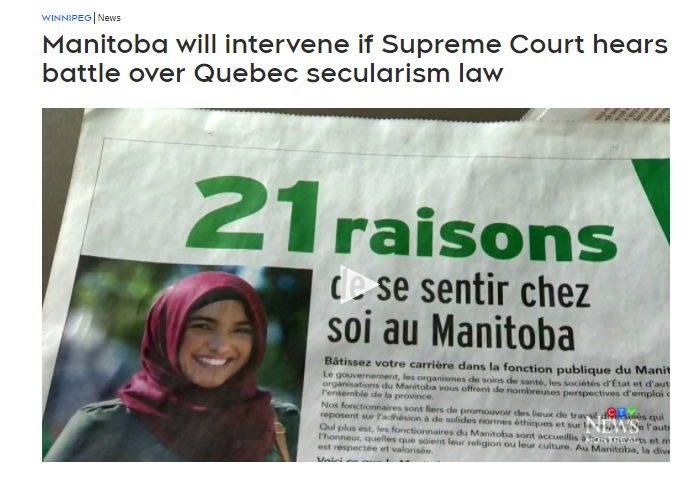The Manitoba government would move to join the battle against Quebec's law on religious symbols if it were to go before the Supreme Court of Canada, says the province's justice minister.
"It's a Quebec bill, but it does have broad implications for religious freedom in Canada generally," Kelvin Goertzen said Monday.
"Any time these cases get to the Supreme Court ... they do set precedent and they do often say things that have impacts on other pieces of legislation."
The Quebec law, commonly called Bill 21, bans public sector workers who are deemed to be in positions of authority -- including teachers, judges and police officers -- from wearing religious symbols on the job.
Last year, Quebec Superior Court Justice Marc-Andre Blanchard found that the law has cruel and dehumanizing consequences for those who wear religious symbols. However, he ruled that most of the bill must be allowed to stand because Quebec invoked the notwithstanding clause.
The judge struck down provisions that related to English-language school boards and a ban on members of the provincial legislature wearing face coverings.
Both the Quebec government and groups opposing the law have taken the case to the Quebec Court of Appeal. Goertzen said it is almost certain to be appealed further to the Supreme Court of Canada.
Federal Justice Minister David Lametti announced last month that the federal government would join in a legal challenge before the high court.
Goertzen said Manitoba would seek intervener status as well to uphold religious rights under the Charter of Rights and Freedoms. The Progressive Conservative government had previously said it was considering doing that, but Goertzen said Monday he has committed to the idea and has instructed the Justice Department to prepare.
"While the Charter and other principles of religious freedom talk about state neutrality, what Quebec is looking at isn't what I would argue to be neutrality," Goertzen said.
"Neutrality involves the state not promoting one religion over the other. That's not the same thing as barring or banning religious symbols."
In 2019, the Manitoba government took out newspaper and digital advertisements in Quebec to try to persuade civil servants there to move to Manitoba if they felt threatened by the ban on religious symbols.
Brian Pallister, premier at the time, also wrote letters to Quebec professional organizations, colleges and other entities to invite public-sector workers to move west. There was no reported take-up on that offer.
Quebec Premier Francois Legault has defended Bill 21 as a legitimate way to ensure secularism in the public sector. He has said the law is broadly supported by Quebecers and was passed democratically.
This report by The Canadian Press was first published June 13, 2022.































